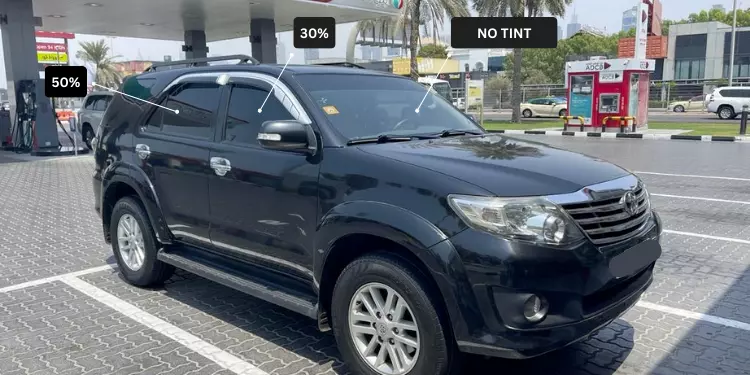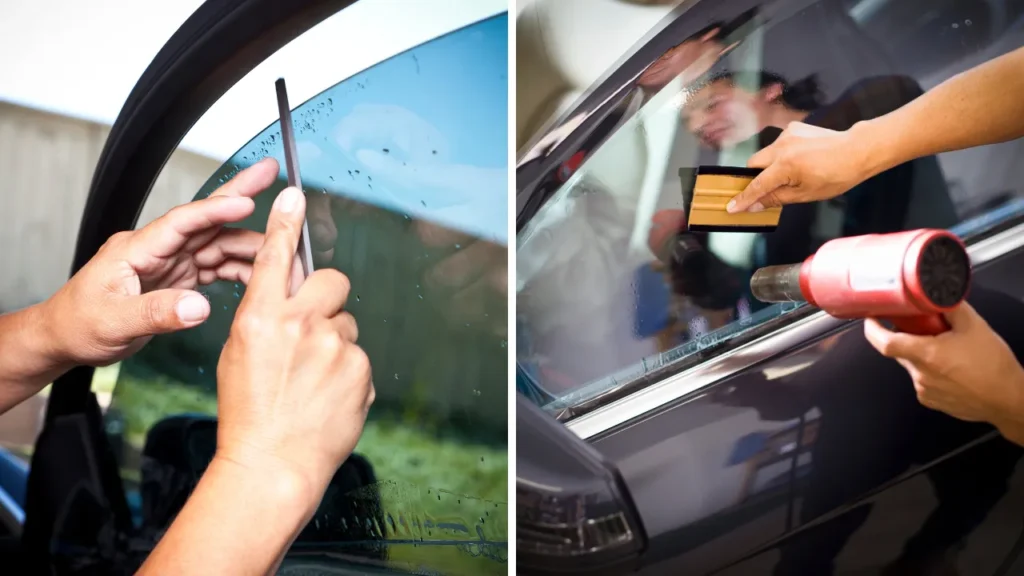Table of Contents
The United Arab Emirates (UAE) has specific regulations regarding the tinting of vehicle windows. These regulations aim to ensure the safety of drivers and passengers, maintain visibility on the roads, and comply with international standards. Understanding the legal tint limit in the UAE is crucial to avoid penalties and ensure a comfortable driving experience.

1 Importance of Tinted Windows
Tinted windows offer several benefits, including protection against harmful UV rays, reduced glare, enhanced privacy, and improved temperature control within the vehicle. With the intense sunlight and high temperatures experienced in the UAE, tinted windows can significantly reduce the heat inside the car, making the driving experience more comfortable. Additionally, tinted windows help to block harmful UV rays, which can cause skin damage and fading of the car’s interior. Furthermore, by reducing glare from the sun and headlights of other vehicles, tinted windows enhance visibility and reduce eye strain, promoting safer driving conditions.
2 Legal Tint Limit in the UAE
To maintain road safety and prevent any potential misuse of excessively tinted windows, the UAE has set specific guidelines for the maximum allowable tint on various vehicle windows.

Front Windshield Tint
The front windscreen of an automobile must have a minimum visual light transmission (VLT) of 70%, according to the Dubai Roads and Transport Authority (RTA). So, the front windscreen’s tinting cannot be darker than 30%.
In contrast, a tinted strip up to 30 cm wide may be fitted on top of the front windscreen as long as it doesn’t extend below the AS1 line, a marking on the glass that designates the maximum allowable tinting level. The RTA recommended that the window tint legal limit for tinted strips be positioned at the top of the windscreen instead of directly in the driver’s line of sight since it should not impair the driver’s vision of the road.
Ensure that only premium window tinting films that meet certain standards are used on automobile windows. If subpar or unapproved tinting films are used, there can be fines and other legal ramifications.
The front windscreen is an essential component of a car’s safety system, and tinting it can affect how well it functions, especially at night or in low light. It is advisable to carefully assess the front windshield’s level of tinting and speak with a professional tinting provider to ensure that it complies with applicable legislation and does not endanger the safety of the driver or passengers.
Side Windows Tint
For side windows, the legal tint limit in the UAE is 50%. This means that the tinted film should allow at least 50% of light to pass through. It is crucial to ensure that the level of tint does not hinder the visibility of the driver from inside the vehicle. Additionally, the tint should be evenly applied without any bubbles or distortions that could affect the driver’s view. Adhering to the 50% tint limit is essential to maintain clear visibility while enjoying the benefits of tinted windows.
Rear Windows Tint
Similar to side windows, the rear windows can also have a tint level of 50% in the UAE. However, it is crucial to note that the rear window tinting must not obstruct the view of the rearview mirror. The rearview mirror is an essential safety feature that allows the driver to see the vehicles behind and make informed decisions while driving. Therefore, it is important to ensure that the tint is applied in a way that does not interfere with the functionality of the rearview mirror.
3 Penalties for Excessive Tinting
Failure to comply with the legal tint limit in the UAE can result in penalties and fines. Law enforcement authorities conduct regular checks to ensure that vehicles adhere to the specified guidelines. If a vehicle is found to have tinted windows that exceed the legal limit, the driver may face consequences such as fines, confiscation of the vehicle registration, or even impoundment. It is essential for vehicle owners to be aware of these penalties and ensure compliance with the legal tint limit to avoid any legal issues and maintain road safety.
4 Exceptions to the Tint Limit
While the UAE has specific regulations for tinted windows, there are a few exceptions to the standard rules. These exceptions include:
Medical Conditions
In cases where a driver or passenger has a medical condition that requires additional protection from the sun, an exemption from the tint limit may be granted. However, to avail this exemption, the individual must obtain prior approval from the relevant authorities and carry the necessary documentation within the vehicle. Medical conditions such as photosensitivity or certain skin conditions may warrant the need for additional sun protection, and the authorities take these factors into consideration when granting exemptions.
Embassy and Diplomatic Vehicles
Vehicles belonging to embassies, consulates, and diplomatic missions are often granted exceptions from the tint limit regulations. These exemptions are typically based on diplomatic privileges and are subject to specific guidelines and permissions issued by the authorities. It is important to note that these exceptions are granted to diplomatic vehicles only and not to vehicles owned by individuals who are not part of the diplomatic community.
5 Tips for Choosing Tinted Windows

When considering tinting your vehicle windows within the legal limit, it is essential to keep a few factors in mind:
- Select a Reputable Tinting Service: Choose a professional and reputable service provider for the installation of tinted films to ensure compliance with legal requirements and the use of high-quality materials. Research different tinting service providers, read reviews and ask for recommendations to ensure that the chosen provider has a good reputation and delivers satisfactory results.
- Consider Local Weather Conditions: Take into account the local climate and weather conditions when choosing the tint level. The UAE experiences intense sunlight and high temperatures, so opting for a higher tint percentage may be suitable for better protection against UV rays and heat. Consult with tinting experts who are familiar with the local weather conditions to determine the most appropriate tint level for your specific needs.
- Seek Professional Advice: Consult with experts in automobile tinting to understand the available options, legal requirements, and the best tinting solution for your specific needs. Tinting professionals have extensive knowledge and experience in the field and can provide valuable advice and guidance. They can assess your requirements, explain the pros and cons of different tinting options, and help you make an informed decision.
6 Conclusion
Understanding the legal tint limit in the UAE is crucial for vehicle owners to avoid penalties and ensure road safety. Adhering to the specified regulations for front windshields, side windows, and rear windows is necessary to maintain visibility while enjoying the benefits of tinted windows. Remember to choose a reputable tinting service and seek professional advice to ensure compliance with legal requirements and a comfortable driving experience. By following these guidelines, you can enjoy the advantages of tinted windows while staying within the boundaries of the law.
7 FAQ
1. What is the legal tint limit for the front windshield in the UAE?
According to UAE law, the front windshield should not have any tint, except for a clear film placed on the uppermost part known as the visor strip. The visor strip should not exceed 14 centimeters in width, starting from the top edge of the windshield.
2. What is the legal tint limit for side windows in the UAE?
The legal tint limit for side windows in the UAE is 50%. This means that the tinted film should allow at least 50% of light to pass through.
3. What is the legal tint limit for rear windows in the UAE?
Similar to side windows, the legal tint limit for rear windows in the UAE is also 50%. However, it is important to ensure that the tint does not obstruct the view of the rearview mirror.
4. What are the penalties for excessive tinting in the UAE?
Failure to comply with the legal tint limit in the UAE can result in penalties and fines. The driver may face consequences such as fines, confiscation of the vehicle registration, or even impoundment. It is important to be aware of these penalties and ensure compliance with the legal tint limit to avoid legal issues and maintain road safety.











